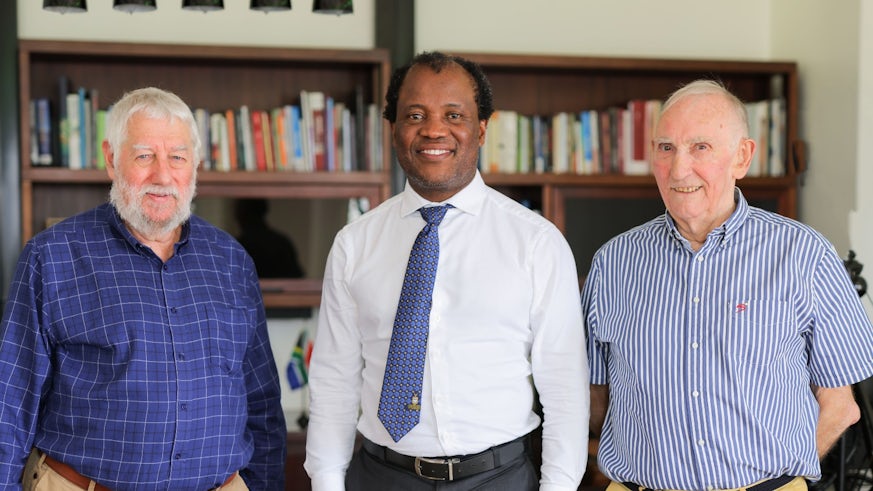Sustainable energy on the agenda at Wits
21 April 2023

Professor Graham Hutchings CBE FRS joined fellow distinguished scientists at the event in South Africa
Three leading scientists reunited at the University of the Witwatersrand, Johannesburg, to discuss the role Wits can play in sustainable energy developments.
Professors Graham Hutchings, Regius Professor of Chemistry at Cardiff, and Roger Sheldon FRS joined Professor Zeblon Vilakazi FRS, the Vice-Chancellor and Principal of Wits University for the event.
Professor Hutchings said: “It is a real pleasure to return to Wits, an institution I see as my first academic home. Our discussions were based on the role Wits and Southern Africa can play as leaders in using sustainable energy effectively for the benefit of society as whole".
Renowned for his work in heterogenous catalysis, Professor Hutchings pioneered the use of gold as a catalytic agent. As gold catalysts allow cleaner reactions with fewer by-products, this has enabled better environmental protection by the chemical industry. Professor Hutchings has received a number of honours throughout his career, including awards for green chemistry and sustainability.
A fellow former Wits academic, Professor Sheldon FRS, is known as a founder of green chemistry, having developed a key measure, known as the E factor, for assessing the environmental impact of chemical processes. Now Emeritus Professor of Biocatalysis and Organic Chemistry at the Delft University of Technology in the Netherlands, his research interests include green chemistry, catalysis, and enzyme immobilisation.
Professor Sheldon said: “Everything we use, we borrow from future generations. We must put it back as we have received it.
“Natural resources should be used at rates that do not unacceptably deplete supply over the long-term. We are using fossil fuels much faster than the rate at which they are being generated and we are generating carbon dioxide at a rate that can’t be assimilated by the environment, and that is leading to climate change.”
Professor Vilakazi, a nuclear physicist, was instrumental in establishing South Africa's first experimental high-energy physics research group focusing on development of the High-level Trigger for the CERN-ALICE experiment at the Large Hadron Collider. He also acted as a visiting scientist at the Atomic Energy Commission and Alternative Energy in Saclay, France.
Professor Vilakazi said: “It was a pleasure to indulge in conversation with two world-renowned chemists.
“The work that they undertake extends well beyond the laboratory – their work has multiple applications and impacts positively on society in so many ways.”
All three scientists are Fellows of the Royal Society, a prestigious, independent scientific academy dedicated to promoting excellence in science for the benefit of humanity.
